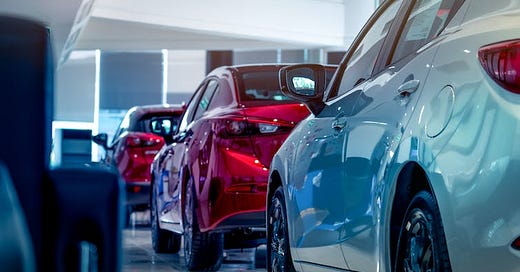It’s good the High Court overturned Victoria’s questionable EV tax. But there’s a sting in the tail
My latest in The Conversation
For anyone concerned with the need to decarbonise transport – or with sound economic policy – yesterday’s High Court ruling might seem like good news.
The court ruled Victoria’s tax on road use for zero- and low-emissions vehicles was unconstitutional, after two electric car drivers challenged the state’s ability to impose excise-type levies.
But given the High Court’s previous track record on constitutional interpretation, there’s a grave danger this decision will be extended to rule out any kind of road user charge. It threatens many other state levies too, from luxury cars to mining royalties.
Why was Victoria’s tax so bad?
EV drivers don’t buy petrol or diesel, which means they avoid the fuel excise that other drivers pay – and which pays for road maintenance. That’s why Victoria introduced its EV road user charge, which cost owners about two cents per kilometre driven.
Despite this plausible-sounding rationale, the road user charge was terrible policy, both environmentally and economically. A tax specific to electric vehicles could only slow their adoption, at a time when early adopters need to be encouraged.
And in economic terms, the policy rested on a misunderstanding of economics. The tax was supposed to address a “distortion” in the incentives generated when electric vehicle drivers paid less to use the roads than internal combustion engine vehicle drivers.
But the government’s reasoning didn’t take into account a central principle of economic policy – the theory of the second-best.
Read more: Victoria's electric vehicle tax and the theory of the second-best
Drivers who fill up with petrol, gas or diesel don’t bear the social and environmental costs of their choices in the form of carbon dioxide and other pollutants emitted, or the cost of the damage done to our lungs.
So by taxing EVs, you make traditional car drivers better off – and that leads to worse social outcomes overall.
Three years ago, I finished a critique of the policy on a positive note, suggesting it opened the door to broader road user charges based on kilometres travelled.
Sadly, it seems my assessment was premature.
In recent decades, the High Court has been taking ever more expansive interpretations of Section 90 of the Constitution, which prevents state governments from “imposing duties of customs or of excise”.
In the first decades after federation, “excise” was interpreted to refer to taxes levied on goods manufactured in Australia, just as customs duties are levied on imported goods.
Over many years and many High Court decisions, the concept was broadened to include any tax or fee that increases the costs of goods for consumers.
The last remaining obstacle was the “Tobacco Tax” decision in 1974, which excluded consumption taxes from Section 90’s scope.
But that, too, is now gone. Despite some scathing dissenting opinions, a 4-3 majority overturned the 1974 precedent and expanded the scope of Section 90 even further.
In doing so, they have created large headaches for state and territory leaders, who have propped up state finances with an assortment of taxes, excise schemes and other charges that could now be subject to legal challenge.
Did the High Court just kill road user charges entirely?
Victoria’s law was a bad one. But other road user charges can be very useful, as a way to discourage overuse of private vehicles, charge heavy drivers more, or speed up the shift to clean, quiet EVs.
The reasoning of the High Court majority – which held that the Victorian charge wasn’t related to the cost of providing roads – leaves some hope that a broader road user charge might pass muster.
But to the extent that different kinds of vehicles were charged differently, it seems entirely possible the court might rule that road user charges are an unconstitutional excise. And the recent tendency of the court has been to push logical consistency up to, and beyond, the limits of reason.

We saw this with the saga over Section 44. Early decisions ruled dual citizens were not eligible to stand for parliament. Later, the court’s interpretation expanded to cover people who had lived their entire lives in Australia but who could theoretically be eligible for another citizenship. The end result was that as many as half of all Australians were ineligible to serve in parliament.
We can hope the current decision will not be stretched in the same way. But nothing is guaranteed.
It may be that the only way to replace our current fuel taxes with road user charges will be through a uniform charge imposed by the Commonwealth.
There may be some creative alternatives. One way to resolve the problem might be to turn all roads into “virtual” toll roads, charging drivers based on use and converting state transport departments into government business enterprises.
For the moment, we can be grateful the Victorian government’s misguided and muddled tax policy has been scrapped – and a barrier to EV uptake is gone. But the High Court’s decision has flagged the need for urgent action at the national level to work out a consistent policy.




A threshold for numbers of vehicles (or road-km use) that are EV's before applying a road tax to them? Provide other subsidies/incentives, greater than that tax? We need to rapidly grow EV use for good reasons.
But expecting soundly based foresight and planning that internalizes the cumulative significance of climate change to survive the politicking - which still includes high levels of Doubt, Deny, Delay obstruction and opposition - seems optimistic.
Don't understand this logon stuff, am told I have 24 hours before it runs out. So sick of companies making things more complicated than they need to be.
On the issue, fossil fuels lobby.
Beginning middle and end...